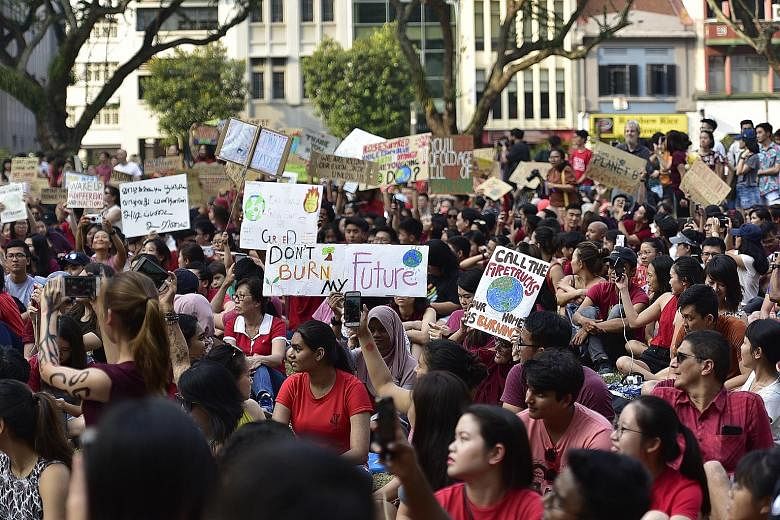Scientists say the world is on fire, and global momentum to put out the flames is building, even in Singapore.
Prime Minister Lee Hsien Loong sounded the clarion call for the country to tackle climate change in his National Day Rally speech in August, calling it an existential threat for Singapore. His announcement appears to have propelled climate change into the national consciousness.
In a Straits Times online poll of 1,000 respondents, 40 per cent said they were more concerned about the issue after listening to his speech.
A month later, about 2,000 Singaporeans and permanent residents attended a rally at Hong Lim Park to call for more action on climate change.
The growing interest in climate change here comes at a time when the issue is also gaining significant traction globally.
A number of countries, including Britain and France, have formally declared climate emergencies - a move enshrined in legislation for stronger action, such as having net-zero emissions by 2050.
And over the past year or so, the United Nations' climate science body, the Intergovernmental Panel on Climate Change, published three special reports on various aspects of global warming.
They range from the different impacts of a 1.5 deg C versus a 2 deg C warming scenario, as well as the impacts of climate change on land use, the oceans and the cryosphere - the frozen parts of the planet.
All three reports, as well as others from organisations such as the National Aeronautics and Space Administration, highlight the science behind why tackling global warming is paramount.
As the climate changes, it is not just the environment that suffers.
There will also be knock-on effects on human lives.
Why it matters
Recent events have demonstrated how exactly climate change will impact the human race.
Tropical forests and tundra are aflame.
Tropical cyclones have slammed into nations ringing the Pacific and Atlantic, causing widespread death and destruction.
India continues to wilt in the heat, and rising seas are forcing people to move inland.
Carbon dioxide, emitted when humans burn fossil fuels or clear forests, is a greenhouse gas. It traps heat on the planet.
All the excess heat in the system is altering the radiative balance of the planet and throwing the climate system out of whack.
It might be difficult to link individual extreme weather events to climate change. But just as how a baseball player on steroids can hit more home runs than one without, so too is global warming increasing the likelihood of more frequent and intense extreme events.
In the planet's 4.5 billion-year history, the climate has changed numerous times due to other natural factors.
The planet righted itself each time, but many life forms went extinct during each transition. There have been five mass extinction events, and biologists have said we are now going through the sixth.
But a difference between climate change throughout the earth's geological history and now is the rate of change. The planet can adapt, but can mankind do so quickly enough?
There is also the issue of environmental justice.
Rich countries such as Singapore can cope with the impacts of climate change. It can build sea walls to keep the rising tides at bay and air-condition its homes and offices to keep cool in the stifling heat.
But the most vulnerable in the world cannot afford to do the same.
Climate change is a global crisis, and inaction would condone the prioritisation of the lives and well-being of one group over another.
What lies ahead
Singapore - which relies on natural gas, the cleanest form of fossil fuel, for its energy needs - has indicated that it will do more.
It will, for example, ramp up its deployment of solar panels so that it can harness the renewable energy source most available to it.
At the same time, it aims to boost energy efficiency in all sectors.
Singapore is also the first country in South-east Asia to implement a carbon tax from this year, with revenue collected from the tax being ploughed back into support for emission reduction projects and energy efficiency schemes.
It also aims to improve its public transport network and provide greater infrastructure for electric vehicles.
Singapore will also be updating the climate pledge that it made under the Paris Agreement to guide its policies over the longer term.
More details on this could be available as soon as the first quarter of next year, say observers.
But considering that Singapore contributes just 0.11 per cent to global emissions, will efforts here matter in the grand scheme of things?
The answer is yes, because solving a collective action problem such as climate change requires all hands on deck.
Even small countries such as Singapore can play a part.
In putting climate change on the national agenda back in August, PM Lee had likened the threat to war.
He said then: "Both the Singapore Armed Forces and climate change defences are existential for Singapore. These are life and death matters.
"Everything else must bend at the knee to safeguard the existence of our island nation."
In a recently published book on climate change, We Are The Weather, author Jonathan Safran Foer also used a war-time analogy to flag the importance of the smallest of actions.
During World War II, he wrote, American civilians living along the East Coast had turned off their lights at dusk to prevent the Germans from using urban backlighting to spot and destroy ships exiting the harbour.
The war could not have been won by the efforts of such individuals alone, he said. Yet, the war could not have been won without them.
He added: "Solidarity was an important asset, even if such gestures would have been foolish - would have been suicidal - if they were the only efforts made."
CLICK HERE TO LISTEN TO ST'S GREEN PULSE PODCAST: https://omny.fm/shows/st-bt/playlists/green-pulse


